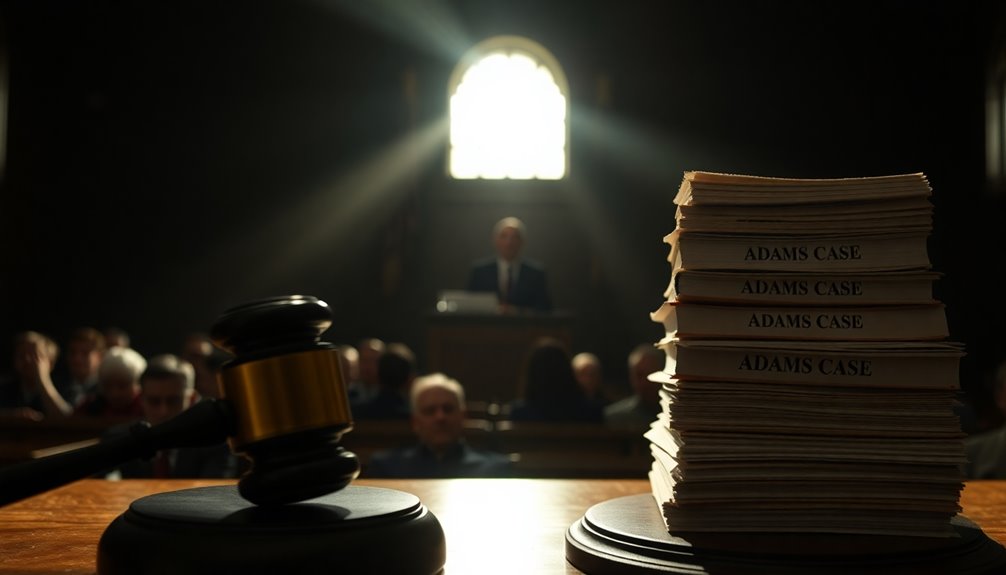The Adams case drama has definitely stirred up questions about the Trump administration's influence over the judicial process. Eric Adams, New York City's mayor, faces bribery and conspiracy charges, but the Justice Department's recent decision to drop the case raises eyebrows. Critics argue that this reflects a troubling lack of judicial independence and may compromise future corruption investigations. If you're curious about the implications of these events, you might want to explore further.
Key Takeaways
- The dismissal of charges against Mayor Adams raises concerns about political influence on judicial decisions reminiscent of Trump administration controversies.
- Critics assert that the Justice Department's intervention undermines the independence of the Southern District of New York, fostering perceptions of bias.
- The case has sparked debates on the integrity of public corruption investigations, potentially eroding trust in the justice system.
- Adams' cooperation with Trump on immigration policies intensifies scrutiny, highlighting the intersection of politics and legal accountability.
- Internal conflicts within the DOJ regarding the Adams case signal potential long-term ramifications for future legal proceedings against public officials.

As the drama surrounding New York City Mayor Eric Adams unfolds, you can't help but notice the implications of judicial manipulation at play. Adams was indicted on serious charges like bribery and conspiracy, but the Justice Department abruptly ordered federal prosecutors to drop the case. This move, they claimed, stemmed from Adams' potential to support the Trump administration's immigration policies.
It raises eyebrows when you consider that prosecutors had already uncovered additional criminal conduct related to Adams' administration. The dismissal of the case requires formal action from prosecutors, along with a judge's approval. Yet, critics argue that the Justice Department's intervention shows a troubling lack of independence. Many see it as a politically motivated decision that undermines the integrity of the judicial process.
The Southern District of New York, typically known for its autonomy, faces scrutiny with this intervention from Washington, suggesting a transactional approach to law enforcement that prioritizes political alliances over legal principles. The fallout has been significant, with the top federal prosecutor in Manhattan resigning, alongside two senior officials. Danielle Sassoon's resignation highlights the internal conflicts within the DOJ regarding this case.
This incident isn't isolated; it echoes past controversies involving the Trump administration's influence on high-profile cases. It reinforces perceptions of bias within the justice system, raising concerns among career prosecutors who argue that it strays from established norms regarding charging decisions.
Public integrity hangs in the balance as the handling of the Adams case could set a dangerous precedent for future corruption investigations. The implications of this intervention extend beyond just one case; they threaten to erode public trust in the justice system's ability to manage corruption impartially.
Adams' cooperation with Trump on immigration has already drawn criticism from advocacy groups, and as he prepares to testify before Congress, the debate over political influence in legal matters continues to intensify. The media coverage surrounding this case fuels ongoing discussions about the role of mayors in immigration enforcement and the integrity of public corruption probes.
Frequently Asked Questions
What Are the Implications of Judicial Manipulation for Future Administrations?
Judicial manipulation can significantly impact future administrations by altering the balance of power.
You might see a judiciary that's less independent, leading to biased rulings that favor political agendas. This erosion of trust could undermine public confidence in the legal system.
Additionally, if norms around judicial appointments change, future leaders may face challenges in securing unbiased judges, ultimately affecting governance and the rule of law for years to come.
How Can the Public Hold Officials Accountable for Judicial Manipulation?
You can hold officials accountable for judicial manipulation by staying informed and engaged.
Participate in public awareness campaigns that highlight the importance of judicial independence. Support media investigations that expose questionable judicial actions. Advocate for stronger ethics codes and transparency in decision-making.
Engage with civil society organizations pushing for reform, and use your voice to call for legislative oversight. Your involvement plays a crucial role in maintaining accountability within the judicial system.
What Legal Remedies Exist for Victims of Judicial Manipulation?
If you're a victim of judicial manipulation, you've got several legal remedies at your disposal.
You can file motions to enforce your rights or seek a writ of mandamus if other options fall short. Courts may impose sanctions or require apologies for rights violations.
Additionally, you can explore civil rights claims under laws like 42 U.S.C. §1983.
Are There Any Historical Precedents for Judicial Manipulation in the U.S.?
Did you know that around 20% of U.S. Supreme Court justices faced impeachment threats throughout history?
When you consider judicial manipulation, historical precedents like the impeachment of Justice Samuel Chase in 1805 stand out. He was targeted for his opinions, highlighting political motives over misconduct.
Additionally, attempts to influence judicial review and align the courts with political interests reflect ongoing concerns about maintaining judicial independence throughout the nation's history.
How Does Judicial Manipulation Affect Public Trust in the Legal System?
Judicial manipulation seriously undermines your trust in the legal system.
When you perceive judges as biased or influenced by political agendas, it erodes your confidence in their impartiality.
As you witness conflicts between the judiciary and political figures, you're likely to feel that the law isn't applied equally.
This growing skepticism can lead to a broader disillusionment with democratic norms, making you question the very foundation of justice that should protect your rights.
Conclusion
You might think the Adams case is just another legal squabble, but it's so much more. It's a chilling reminder of how power can warp justice, leaving ordinary people feeling powerless. The manipulation of the judicial system isn't just about politics; it's about real lives affected by decisions made behind closed doors. We can't afford to turn a blind eye. Together, let's demand transparency and accountability, ensuring that justice is served, not manipulated.








